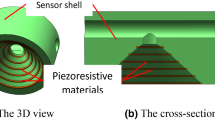Abstract
Despite the advantages of minimally invasive surgery the applicability of (robot assisted) minimally invasive techniques is limited to simple operations due to the lack of tactile feedback. Tactile feedback is essential in many operations such as border detection during tumor resections and localization of nerves and veins embedded in soft tissue. This work compares the performance of existing tactile stimulation methods using psychophysical techniques in an edge detection test. Several mechanical and psychophysical design considerations for lateral skin stretch and perpendicular indentation displays are given. Considering the list of disadvantages, related to lateral skin stretch, we conclude that perpendicular indentation is the preferred stimulation method for tactile feedback systems to be used in minimally invasive surgery.
Preview
Unable to display preview. Download preview PDF.
Similar content being viewed by others
References
De Gersem, G.: Kinaesthetic feedback and enhanced sensitivity in robotic endoscopic telesurgery, Phd Thesis, Engineering Faculty, K.U.Leuven (2005)
Norton, J.A., Shwaker, T.H., Doppman, J.L., Miller, D.L., Fraker, D.L., Cromack, D.T., Gorden, P., Jensen, R.T.: Localisation and surgical treatment of occult insulinomas, Anals of surgery, pp. 615–620 (1990)
Hayward, V., Cruz-Hernandez, J.M.: Tactile display device using distributed lateral skin stretch. In: Proceedings of the haptic interfaces for virtual environment and teleoperator systems symposium, pp. 1309–1314 (2000)
Drewing, K., Fritsch, M., Zopf, R., Ernst, M.O., Buss, M.: First evaluation of a novel tactile display exirting shear force via lateral displacement, Notes of the Touch Hapsis Project, pp. 1–18 (2002)
Pasquero, J.: Survey on communication through touch, McGill University center for intelligent machines, Montreal, pp. 1–27 (2006)
Benali-Khoudja, M., Hafez, M., Alexandre, J.M., Kheddar, A.: Tactile interfaces: a sate-of-the-art survey. In: Proceedings of the 35th symposium on robotics, pp. 1–9 (2004)
Gescheider, G.A.: Psychophysics: Method and Theory, pp. 1–164. Lawrence Erlbaum Associates, Hillsdale (1976)
Author information
Authors and Affiliations
Editor information
Rights and permissions
Copyright information
© 2008 Springer-Verlag Berlin Heidelberg
About this paper
Cite this paper
Peeters, K., Sette, M., Goethals, P., Vander Sloten, J., Van Brussel, H. (2008). Design Considerations for Lateral Skin Stretch and Perpendicular Indentation Displays to Be Used in Minimally Invasive Surgery. In: Ferre, M. (eds) Haptics: Perception, Devices and Scenarios. EuroHaptics 2008. Lecture Notes in Computer Science, vol 5024. Springer, Berlin, Heidelberg. https://doi.org/10.1007/978-3-540-69057-3_40
Download citation
DOI: https://doi.org/10.1007/978-3-540-69057-3_40
Publisher Name: Springer, Berlin, Heidelberg
Print ISBN: 978-3-540-69056-6
Online ISBN: 978-3-540-69057-3
eBook Packages: Computer ScienceComputer Science (R0)




